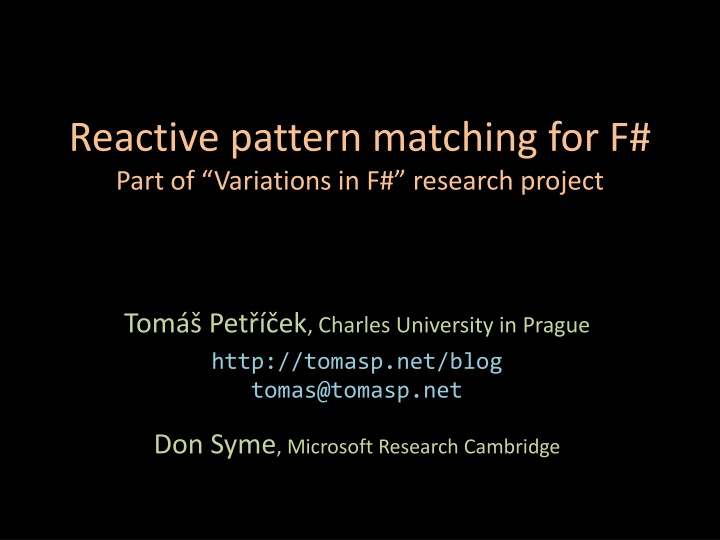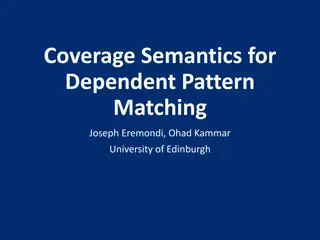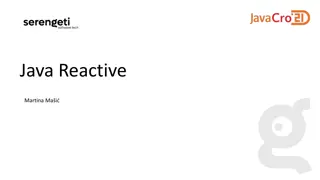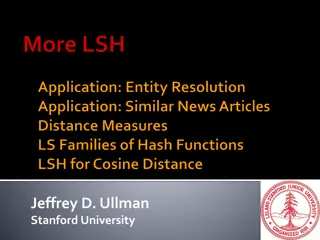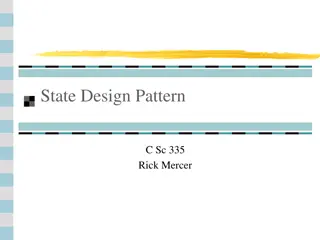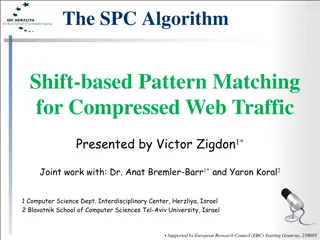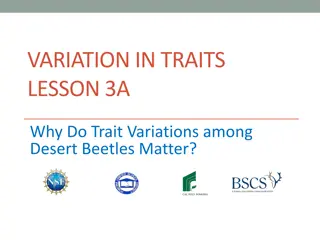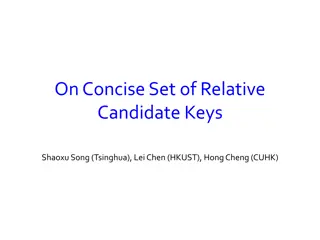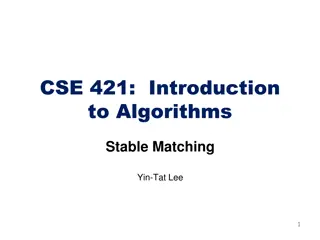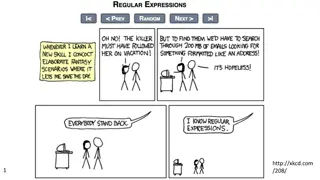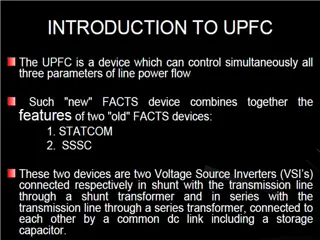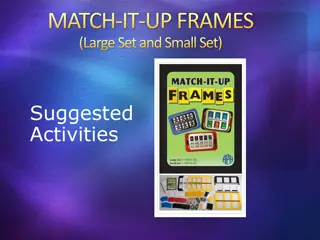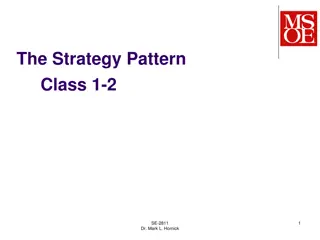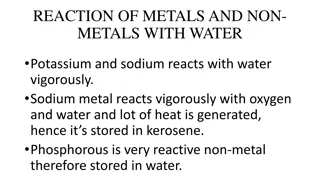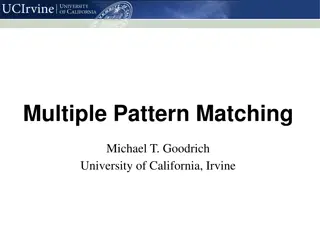Reactive Pattern Matching for F# - Variations in F# Research Project
This project delves into the realm of reactive programming in F#, exploring pattern matching, asynchronous workflows, and concurrent design patterns. The talk emphasizes the flexibility of languages in supporting various programming modes and patterns, without the need for rigid commitments to a specific approach. Key themes include encoding concurrent and reactive programs with rich libraries, writing user interface control logic, and leveraging computation expressions effectively.
Download Presentation

Please find below an Image/Link to download the presentation.
The content on the website is provided AS IS for your information and personal use only. It may not be sold, licensed, or shared on other websites without obtaining consent from the author.If you encounter any issues during the download, it is possible that the publisher has removed the file from their server.
You are allowed to download the files provided on this website for personal or commercial use, subject to the condition that they are used lawfully. All files are the property of their respective owners.
The content on the website is provided AS IS for your information and personal use only. It may not be sold, licensed, or shared on other websites without obtaining consent from the author.
E N D
Presentation Transcript
Reactive pattern matching for F# Part of Variations in F# research project Tom Pet ek, Charles University in Prague http://tomasp.net/blog tomas@tomasp.net Don Syme, Microsoft Research Cambridge
The key theme of the talk Languages support (overly) rich libraries for encoding concurrent and reactive programs In practice, used in modes or design patterns such as tasks, threads, active objects, etc. Languages can provide better support for concurrent and reactive programming We don t have to commit the language to one specific mode or design pattern
Agenda Background Asynchronous programming in F# Reactive programming Writing user interface control logic Pattern matching on events Programming with event streams Concurrency Pattern matching and concurrency
Computation expressions Compose expressions in a customized way <builder> { let! arg = function1() let! res = function2(arg) return res } Meaning is defined by the <builder> object For example, we could propagate null values (aka the maybe monad in Haskell) let LoadFirstOrder(customerId) = nullable { let! customer = LoadCustomer(customerId) let! order = customer.Orders.FirstOrDefault() return order }
Asynchronous workflows Writing code that doesn t block threads let http(url:string) = async { let req = HttpWebRequest.Create(url) let! rsp = req.AsyncGetResponse() let reader = new StreamReader(rsp.GetResponseStream()) return! reader.AsyncReadToEnd() } let pages = Async.Parallel [ http(url1); http(url2) ] We can use it for various design patterns Fork/Join parallelism involving I/O operations Active objects communicating via messages
Agenda Background Asynchronous programming in F# Reactive programming Writing user interface control logic Pattern matching on events Programming with event streams Concurrency Pattern matching and concurrency
Reactive programming with async Concurrent design patterns using async Concurrently executing, communicating agents Using thread pool threads to run computations Reactive programming design pattern Uses the same language and additional libraries Multiple agents running on a single thread Agents mostly wait for events, then react quickly
Example: counting clicks Takes int as an argument and returns Async<unit> Show the number of left button mouse clicks Resumes the agent when the event fires let rec loop(count) = async { let! me = Reactive.AwaitEvent(lbl.MouseDown) let add = if me.Button = MouseButtons.Left then 1 else 0 lbl.Text <- sprintf "Clicks: %d" (count + add) return! loop(count + add) } Continue running using loop loop(0) |> Async.Start This looks like an aggregation of events Can we make it simpler? Yes, in this particular case
Example: counting clicks Modification - let s limit the clicking rate let rec loop(count) = async { let! me = Reactive.AwaitEvent(lbl.MouseDown) let add = if me.Button = MouseButtons.Left then 1 else 0 lbl.Text <- sprintf "Clicks: %d" (count + add) let! _ = Reactive.Sleep(1000) return! loop(count + add) } Resumes the agent after 1000 milliseconds loop(0) |> Async.Start How can we describe agents in general? Agent is often just a simple state machine!
Agents as state machines start The elements of a state machine States and transitions In each state, some events can trigger transitions We can ignore all other events AwaitEvent( ) MouseDown occurred after 1000 milliseconds Sleep(1000) start We need one more thing Selecting between several possible transitions inactive KeyPress KeyPress active(count) MouseDown occurred
Selecting between transitions Single-parameter AwaitEvent isn t sufficient Select cannot be encoded in our base language Resume when the first of the events occurs IEvent< A> * IEvent< B> -> Async<Choice< A * B>> let rec active(count) = async { let! ev = Async.AwaitEvent(frm.KeyPress, frm.MouseDown) match ev with | KeyPress(_) -> return! inactive() | MouseDown(_) -> printfn "count = %d" (count + 1) return! active(count + 1) } return! active(count + 1) } let rec active(count) = async { let! ev = Async.AwaitEvent(frm.KeyPress, frm.MouseDown) match ev with | Choice1Of2(_) -> return! inactive() | Choice2Of2(_) -> printfn "count = %d" (count + 1) start inactive KeyPress KeyPress and inactive() = async { let! me = Async.AwaitEvent(frm.MouseDown) return! active(0) } Async.Start(inactive()) Async.Start(inactive()) and inactive() = async { let! me = Async.AwaitEvent(frm.MouseDown) return! active(0) } active(count) MouseDown occurred
Agenda Background Asynchronous programming in F# Reactive programming Writing user interface control logic Pattern matching on events Programming with event streams Concurrency Pattern matching and concurrency
Adding language support for joining Let s start with the previous version let rec active(count) = async { let! ev = Async.AwaitEvent(frm.KeyPress, frm.MouseDown) match ev with | Choice1Of2(_) -> return! inactive() | Choice2Of2(_) -> printfn "count = %d" (count + 1) return! active(count + 1) } return! active(count + 1) } let rec active(count) = async { match! frm.KeyPress, frm.MouseDown with | !ke, _ -> return! inactive() | _, !me -> printfn "count = %d" (count + 1) Computation expression specifies the semantics Here: Wait for the first occurrence of an event Pattern matching is more expressive than select Reactive pattern matching for F#
Expressive power of joins Matching events against commit patterns Either commit ( !<pattern> ) or ignore ( _ ) Important difference between !_ and _ Filtering we can specify some pattern match! agent.StateChanged, frm.MouseDown with | !(Completed res), _ -> printfn "Result: %A" res | _, !me -> // Process click & continue looping Joining wait for the first occurrence of each match! frm.MouseDown, frm.MouseUp with | !md, !mu -> printfn "Draw: %A-%A" (md.X, md.Y) (mu.X, mu.Y)
Agenda Background Asynchronous programming in F# Reactive programming Writing user interface control logic Pattern matching on events Programming with event streams Concurrency Pattern matching and concurrency
Turning agents into event streams Agents often perform only event transformations Repeatedly yield values and may eventually end Event streams can be elegantly composed Async<unit> EventStream<T> T T T T T
Turning agents into event streams Agents often perform only event transformations Repeatedly yield values and may eventually end Event streams can be elegantly composed Library support using computation expressions let rec active(count) = eventStream { match! frm.Click, frm.KeyPress with | !ca, _ -> return! inactive() | _, !ka -> yield (count + 1) return! active(count + 1) } return! active(count + 1) } let rec active(count) = eventStream { match! frm.Click, frm.KeyPress with | !ca, _ -> return! inactive() | _, !ka -> printfn "count = %d" (count + 1) inactive().Add(fun n -> printfn "count=%d" n)
Agenda Background Asynchronous programming in F# Reactive programming Writing user interface control logic Pattern matching on events Programming with event streams Concurrency Pattern matching and concurrency
Concurrency using Futures Computation that eventually completes Used for encoding task-based parallelism Similar to async, but used for CPU-bound concurrency var f1 = Future.Create(() => { /* first computation */ return result1; }); var f2 = Future.Create(() => { /* second computation */ return result2; }); UseResults(f1.Value, f2.Value); Synchronization (join) point - blocks until both complete
Pattern matching on Futures What does match! mean for Futures? ! pattern: Wait for the computation to complete _ pattern: We don t need the result to continue Example: Multiplying all leafs of a binary tree let rec treeProduct(tree) = match tree with | Leaf(num) -> num | Node(l, r) -> let pl = treeProduct(l) let pr = treeProduct(r) | !pl, !pr -> return pl * pr } let rec treeProduct(tree) = future { match tree with | Leaf(num) -> return num | Node(l, r) -> match! treeProduct(l), treeProduct(r) with let rec treeProduct(tree) = future { match tree with | Leaf(num) -> return num | Node(l, r) -> match! treeProduct(l), treeProduct(r) with | !0, _ | _, !0 -> return 0 | !pl, !pr -> return pl * pr } pl * pr Joining of futures is a very common task Patterns give us additional expressivity
Concurrency using Cjoins Simple unbounded buffer in C public class Buffer { public async Put(string s); public string Get() & Put(string s) { return s; } } Single synchronous method in join pattern The caller blocks until the method returns Joins on channels encoded using ! patterns: let put = new Channel<_>() let get = new Channel<ReplyChannel<_>>() joinActor {while true do match! put, get with | !v, !chnl -> chnl.Reply(v) } |> Async.Spawn
Time for questions & suggestions! Many components could be single threaded Direct way for encoding state machine is essential Language features can/should be generally useful Thanks to: Don Syme, Claudio Russo, Simon Peyton Jones, James Margetson, Wes Dyer, Erik Meijer For more information: Everything is work in progress Feel free to ask: tomas@tomasp.net
